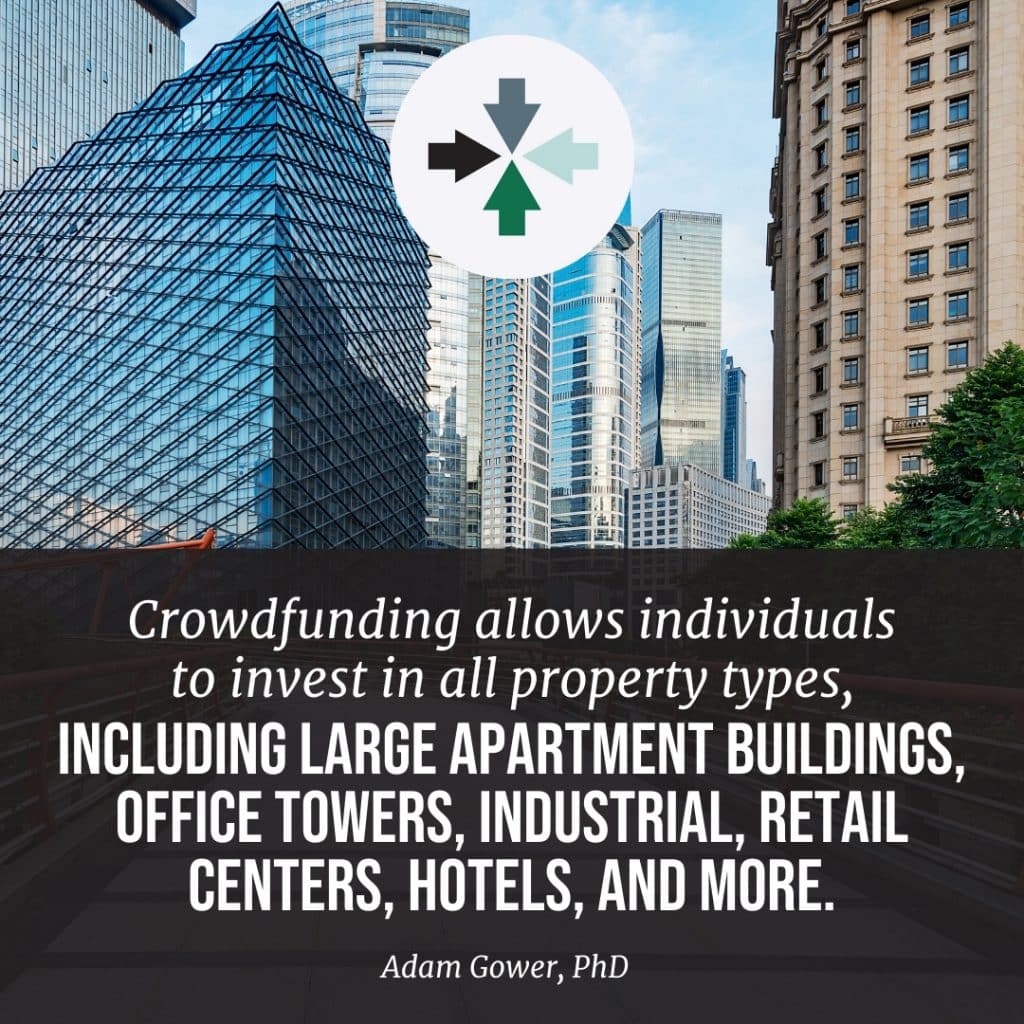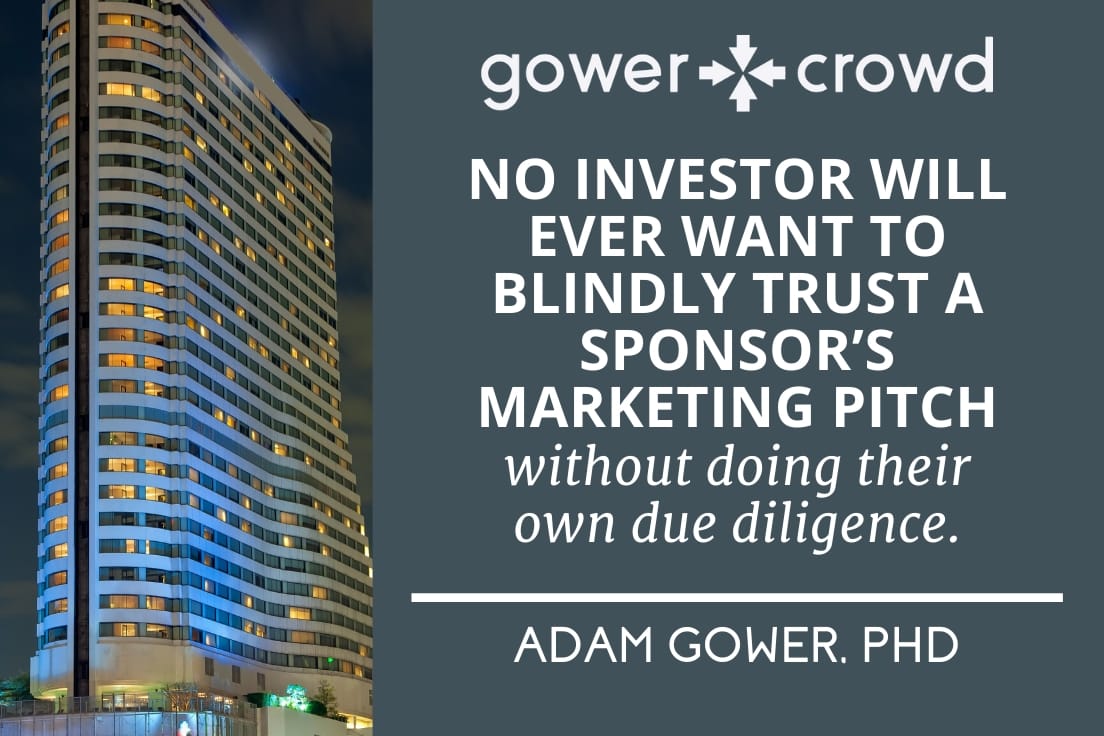FREE TRAINING
What is Real Estate Crowdfunding?
Learn how to build wealth and earn passive income in real estate while someone else does all the work.
Should You Invest in Real Estate Crowdfunding?
By Adam Gower Ph.D.
Historically, a person’s access to commercial real estate opportunities was highly dependent on who they knew and the resources they had. Those with strong networks – those who had long-term relationships with brokers, lenders, real estate operators and the like – would have almost exclusive access to some of the most profitable deals. The more money they had to invest, the wider doors would be that would open to them.
This meant that average investors were typically shut out of the larger, more lucrative commercial real estate deals.
That all changed with the passage of the JOBS Act in 2012 which provided new opportunities for sponsors to solicit investment via online crowdfunding and for investors to invest with them. Sponsors no longer needed to have a personal relationship with their investors (i.e. “country club” capital). They could now sell real estate partnership interests to both accredited and non-accredited investors with substantially reduced restrictions.
Want to get started with real estate crowdfunding? Gower Crowd can show you how.
FREE Real estate syndication education and insight newsletter. Subscribe now.
What is Crowdfunding?
Most people are generally familiar with crowdfunding as a concept. They’ve heard of sites like Kickstarter and GoFundMe, two popular platforms that allow users to solicit investments and donations, respectively, for pet projects or charitable causes. Real estate crowdfunding is similar, except the focus is on pooling capital (debt or equity) from investors that is then invested in a real estate project.
However, it would be a mistake to group the way that non-real estate projects are funded through ‘crowdfunding’ and how real estate is funded. Real estate has always been funded by developers using debt from banks and equity from multiple investors – something you might call ‘crowdfunding.’ The most important part of what the 2012 Act did, however, was that it loosened up the regulations for how a developer could find those multiple investors. Prior to the Act, developers were prohibited from soliciting investment from anyone other than those with whom they had a pre-existing relationship. The Act changed that and allowed for ‘general solicitation’ meaning developers could advertise; they could put up a website, post information on social media, send emails to anyone.
So what the 2012 JOBS (JOBS = Jumpstart Our Business Startups) Act did was that it created the rules for crowdfunding – ostensibly for small businesses and startups– and was never actually intended for real estate. Real estate benefited from the Act, and in fact has come to dominate the use of the regulations promulgated by the Act, but real estate ‘crowdfunding’ is really nothing more than the migration from private backroom dealings that the laws previously required were part of real estate finance, and thrust it out into the public domain where a developer can openly promote their projects and anyone (with some restrictions still) can participate.
This had the effect of dramatically changing the way that deals are structured. One of the most visible of these changes is a reduction in the minimum investments required. Depending on how a crowdfunding deal is structured, a person could invest with as little as $100 or over $1 million. There is no (legal) requirement that an investment minimum must be of a certain size or scale nor is there any restriction on how a deal structures the way capital comes into it – an important point for investors to keep in mind when evaluating any opportunity.
Let’s use a simple example: a sponsor is trying to raise $10 million in equity for their redevelopment project. They’ve already raised $8 million through traditional means. They turn to real estate crowdfunding to raise the remaining $2 million. The sponsor can crowdfund using an array of tools, including both traditional and online media. Increasingly, more are using content marketing to reach a broader audience because this allows them to tap into a pool of prospective investors that is virtually limitless in size.
In the example above, the sponsor may require a $50,000 minimum investment. In order to raise $2 million, they would need up to 40 individual investors. As it turns out, many investors will contribute significantly more than the minimum and therefore, the $2 million could be raised among fewer investors in practice.
Related: Is Real Estate Crowdfunding Legal?

Real Estate Crowdfunding: The Rewards
Although real estate crowdfunding is still in its early growth stages, both developers and investors are already utilizing this model to finance and invest in real estate. For example, developers have two main options for utilizing crowdfunding regulations to finance their deals. Not only can they use it to pool capital for both the debt and/or equity needed for a real estate deal, but they can elect to list their projects on real estate crowdfunding marketplaces like CrowdStreet, RealCrowd, RealtyMogul and others, or they can use the regulations to set up their own content marketing platforms to find prospects and convert them into being investors – or they can utilize a combination of the two.
Similarly, investors who may have no other means by which to invest in real estate otherwise can search online marketplaces or invest directly with developers.
As mentioned above, the notion of aggregating capital from multiple investors to finance a real estate project is not a “new” concept. People have been embarking on real estate joint ventures for decades and, indeed, prior to the 1933 Securities Act that prohibited general solicitation, real estate was crowdfunded with almost no restrictions of any kind. The difference with, and primary benefit to, crowdfunding today and as allowed by the 2012 Act, is that at the same time as developers can openly search for prospective investors using social media and other marketing channels and techniques, hundreds, if not thousands of opportunities (many of which have already been pre-screened) are now available to investors online, who can invest with just the click of a button.
In addition to creating more open, transparent, and accessible commercial real estate markets, there are several other benefits to real estate crowdfunding. We outline some of those benefits below.
Related: 7 Ways You Can Invest in Commercial Real Estate Online
Invest in Properties You Couldn’t On Your Own
One of the biggest hurdles to investing in commercial real estate is lacking the capital to invest individually. The average person does not have the capital, nor the experience, to simply go out and buy a downtown office tower or a hundred-unit apartment building. It would not even cross most people’s minds. Crowdfunding allows people to invest in projects like these, albeit at a much smaller scale. Rather than owning a commercial property individually, someone can buy equity shares in the deal with minimum investments that are a tiny proportion of the overall equity required for the project. Consider it a form of fractional ownership.
Absent real estate crowdfunding, most investors will find themselves buying smaller rental properties, such as duplexes or modest apartment buildings. Scaling a portfolio one small deal at a time is time consuming. It also requires an investor to take on more personal responsibility and financial liability – including, in many cases, guaranteeing a loan. Investing via crowdfunding allows someone to be a passive investor using less of their own capital in any individual project which mitigates concentration risk by allowing for diversification.
High Profit Potential
In order to be appealing to investors, commercial real estate projects listed on crowdfunding marketplace platforms will project high profit potential for investors. It is not uncommon for crowdfunded deals to forecast annualized returns of 15% or more. Passive investors anticipate that their investment can be doubled in five years or less by investing in a crowdfunded project.
Of course, there are certainly caveats to be made here, the most important of which is that real estate investing is replete with forward looking statements. These are the kinds of statements that SEC regulated public companies always disclaim by emphasizing that past performance is no guarantee of future results and that investors can lose money. In real estate investing the same is true; everything a real estate developer tells an investor about returns they may earn be it through preferred returns (dividends) or profit share, are forward looking statements that cannot be guaranteed.
Investors will want to vet each project carefully, paying close attention to the sponsor’s underwriting assumptions.
No investor will ever want to blindly trust a sponsor’s marketing pitch without doing their own due diligence. That said, a benefit to investing in a crowdfunded real estate deal on a marketplace is that the portals that host these opportunities will often provide some level of pre-screening before allowing the deal to be posted to their site. This provides at least a minimum layer of security (at the very least a minimal degree of compliance, for example that the entity operating the real estate deal really has been set up in Delaware (or wherever) and is otherwise not a fraudulent entity).
Similarly, from the sponsor perspective, the marketplaces have systems in place that facilitate mandatory requirements for accepting investors – such as verifying accreditation, know your customer (KYC) and anti-money laundering provisions (AML). They also attempt to provide a secure website environment preventing hackers from stealing investor’s confidential financial information.
Steady Income and Equity
In addition to providing strong annualized returns, investing in real estate through crowdfunding can also provide access to deals with a combination of steady income and equity appreciation. This is often the case when investing in value-add real estate deals with strong in-place cash flow.
Let’s use the example of a developer looking to raise equity for a Class B apartment building. The property is already performing well given local market comps. The developer’s business strategy is to make modest cosmetic improvements to each unit upon turnover. The developer will also be improving the landscaping and adding other on-site amenities as a way to better compete with its Class A competition. Upon successful execution of that strategy, investors should benefit from increased cash flow and property appreciation. An individual investing in a property on their own (i.e. without crowdfunding) may not have the bandwidth or resources to take on a value-add project like this, which limits their income and equity potential.
Related: Understanding Property Classes
Avoid Maintenance and Upkeep Costs
Crowdfunding is one form of passive real estate investing. There are certainly others. Whether you invest passively through crowdfunding or another vehicle, the same holds true: passive real estate investors benefit from handing over day-to-day management to someone else (the sponsor). Passive investors can take a backseat role, thereby avoiding responsibility (financial and otherwise) for routine operations, maintenance and upkeep.
These duties will fall to the project sponsor, including any team members they have brought on to support their work – such as the general contractor, leasing broker, property manager and others. This is a stark contrast to owning property directly, in which case you, as the owner investor, have to deal with all maintenance issues, tenant problems, rent collections and the like.
Crowdfunding presents a great alternative for those looking to dip their toes into the commercial real estate waters without taking the full-fledged plunge into active real estate investing.

Diversify Your Portfolio
Another benefit to crowdfunding is that it allows individuals to diversify their portfolios. Someone who has traditionally invested in stocks and bonds may use real estate crowdfunding to add high-quality commercial real estate to their portfolios.
Diversification can take other forms, as well, such as diversifying real estate holdings by property type or geography.
Crowdfunding allows individuals to invest in all property types, including large apartment buildings, office towers, industrial, retail centers, hotels, and more. An experienced investor whose portfolio is concentrated primarily in direct ownership of boutique hotels (high risk), for example, might want to invest in a few apartment buildings (low risk) via crowdfunding to help better balance their real estate portfolio.
The same is true about geography. One of the benefits of looking at crowdfunding marketplaces is that they will often feature deals across the country. This has made it easier than ever for someone on the west coast to invest in a property on the east coast, and vice versa. Deals that would never be on their radar are now front and center. An investor looking to diversify the geography of their real estate holdings (Sun Belt, anyone?) may turn to crowdfunding as a way to do so.
Another amazing benefit to the investing public as well as for developers is that by allowing for online solicitation, for the first time in history hundreds if not thousands of deals are now all visible in one place i.e. online. Before the 2012 Act allowed for open marketing of real estate projects, the best any individual investor could hope for was access to maybe one or two local developers in their immediate circle. This meant that their entire frame of reference regarding the kinds of terms and conditions offered to investors was restricted to that small sample set with which they were familiar.
Similarly, for developers their knowledge of how other developers structured their deals was limited to what they could glean directly from their competitor developers, from what they heard anecdotally from their own investors, or through their attorneys who may have had a broader perspective of overall market conditions.
Now, in the space of an hour, anyone with an interest can scan multiple real estate crowdfunding marketplaces and access dozens of deals allowing them to compare different kinds of preferred returns, promotes, deal structures and terms and conditions. And herein lies one of the true benefits of real estate crowdfunding, if you will permit me to mix metaphors; as much as it democratizes investing in real estate, it also levels the playing field for all by enhancing transparency across the sector.
Real Estate Crowdfunding: The Risks
There are certainly drawbacks to investing via real estate crowdfunding platforms, which is why these deals still only comprise a small fraction of total commercial real estate transaction volume.
At a high level, some real estate investors are simply skittish about real estate crowdfunding given how new of a concept it is (relatively speaking). Many of the platforms that have emerged are only a few years old. Several were created by tech-gurus funded by private equity enterprises – not real estate experts. This has created very real concerns over the quality of some of the deals featured on different crowdfunding platforms.
Over time, some platforms have begun to emerge as more legitimate than others. Initially, it was hard for investors to discern between them. Some platforms have gone under, the most notable of which is RealtyShares, and some have been acquired by others. While tens of thousands of investors have found comfort in the idea of investing in real estate online, there are at least 11 million accredited investors in the United States so it remains apparent that to the vast majority of investors crowdfunding is either unknown or still seems a bit like the Wild West.
There are risks to consider, which point to why real estate crowdfunding still has a way to go before maturing as an industry, that we outline below.
Riskier Than Other Equity Investments
Crowdfunded real estate is often considered riskier than other equity investments. There are a few reasons for this. First, many inactive investors perceive crowdfunding to be for sponsors who only utilize it as a capital-raising tool of last resort, posting on marketplaces because they have depleted all the ‘traditional’ options available to them. One could surmise that an otherwise high-quality deal would have no problem attracting the debt and equity needed to finance a deal. Crowdfunding is sometimes considered a sponsor’s last-ditch attempt to bridge the gap needed to finance their project, which leaves very real questions about the strength of the deal relative to other potential equity investments.
There may be a grain of truth in this for some sponsors, but investors who allow it to serve as a barrier to their investigating passive real estate investing through crowdfunding are depriving themselves of opportunity through misunderstanding one of the biggest pains in a developer’s daily life: having to deal with investors!
Seriously. Just as investors don’t want to sit down with a developer for meeting after meeting and hear that developer expound on the wonders of their own background and the qualities of the deal, neither do sponsors want to spend their time ‘teaching’ investors about real estate.
In fact, one of the most tiresome parts of developing real estate is the ‘dog and pony’ show of raising money; it detracts from the sponsor’s true skillset which is to compete against other sponsors to find deals, negotiate to buy them, put the team together and execute on the business plan. Developers want to be out there shaking hands (when not restricted by Covid considerations of course) with the plumber and the electrician and the carpenter and getting their hands dirty while making sure that everything is done properly, on time, and to budget.
The opportunity to eliminate the vast majority of that entire process by automating the process, committing it to digital media is greatly superior for both sponsor and investor – wouldn’t you prefer to learn about a developer by watching a video as they explain their business and background, than have to sit down and meet them just to get through that initial screening process?! It frees up everyone’s time; the developer to do what they do best in finding deals and executing on them, and it allows investors to research the sponsor in their own time, from home, at their leisure.
THAT is primarily why developers use crowdfunding platforms or develop their own capabilities; to utilize technology to disrupt what has traditionally been a ridiculously cumbersome business of, by necessity, having to meet with someone to exchange basic background information by way of establishing a relationship. Think about it: you invest in stocks by reading what you can online without meeting the chairman of the company; so why not real estate?
Now that the whole educational process of introducing investors to real estate, to a company, and to a deal can all be automated, the only time an investor and developer really need to ‘meet’ is once a decision has been made to invest and in-person contact seals the deal by verifying the narrative of the online media the developer has created and to ask final deal-specific questions.
What make real estate riskier than other investments is that each deal is of itself a unique business proposition that encompasses unique circumstances of location, cost, and an array of assumptions, any number of which could be wrong or disproved as the project business plan is executed. It is, therefore, especially important that sponsors are open and forthright with investors about their background, so that they can demonstrate to investors that they have the skills and experience to execute the business plan successfully.
And the biggest risk that investors can expose themselves to is in forgetting three golden rules: past performance is no guarantee of future results, you could lose everything, and the higher the returns, the higher the risk. Everything else is just in the details.

Investments Aren’t Liquid
Another drawback of real estate crowdfunding is that investments are illiquid. This is true whenever someone invests passively in a real estate fund, whether capital was raised via crowdfunding or otherwise. Once an investment is made, there are only very limited circumstances by which the original investment may be returned other than through a sale or refinance of the deal – which could take years.
Passive investors usually hold common equity shares, which fall at the top of the capital stack – meaning they have the least control over the fate of the deal. Equity investors in a crowdfunded deal are usually the last to be repaid (behind the primarily loan holder, mezzanine debt and preferred equity) which reduces the chances of being repaid at all.
In some cases, ongoing distributions may be paid as a percentage of the original investment in the form of preferred returns (dividends in stock market-speak). However, distributions may take years to roll in, especially in the case of a ground-up development deal. Those looking for increased liquidity might be better off investing in publicly-traded REITs, which can be purchased and sold daily.
Related: What Is A REIT?
No Income Immediately
As noted above, the nature of a crowdfunded real estate deal (e.g., a ground-up development) may take years to return profits to investors.
There are certainly some exceptions.
For example, a sponsor taking on a value-add project with strong in-place cash flow might be able to provide distributions to investors sooner rather than later. The same would be true if investing independently in a fully-stabilized property with strong cash flow. In the case of the latter, the investor would personally benefit from all net operating income from the get-go through payment of a preferred return.
Moreover, crowdfunding is sometimes used to source debt for a commercial real estate project. When it is debt that is crowdfunded, investors often start earning income on a quarterly, semi-annual or annual basis whereas investing in equity can take three or more years before the investor realizes any return.
FREE Real estate syndication education and insight newsletter. Subscribe now.
Restrictions on Deals
Many platforms maintain a requirement that investors be accredited which restricts the number of deals available to everyday investors, though there are plenty of opportunities for non-accredited investors to find opportunities also.
To be considered an accredited investor, you must have earned $200,000 for each of the last two years and have a reasonable likelihood of doing so again this year, $300,000 if filing as a married couple, OR a net worth of $1 million not including your primary residence.
Is Real Estate Crowdfunding Right for You?
While there are certainly drawbacks to investing in real estate crowdfunding, there’s no reason to believe that interest in investing this way will slow down any time soon. In fact, it’s quite the contrary: as the industry becomes more comfortable with real estate crowdfunding, more sponsors turn to crowdfunding platforms to raise debt and equity for their projects, and we expect that the number of sponsors developing their own crowdfunding capabilities will increase exponentially. This will increase total deal volume and result in more opportunities for individuals to invest.
So, is real estate crowdfunding right for you? There’s no right or wrong answer. This will largely depend on your overall investing strategy, including your time horizon, interest in being an active vs. passive investor, and the rest of your portfolio’s allocation.
Gower Crowd can help you learn how to get started in real estate crowdfunding!
RELATED ARTICLES
Tricks to Finding Distressed Properties For Sale Near You
Last Updated on December 15, 2023 by Dr. Adam Gower NEW BOOK BY ADAM GOWER PH.D. Capital Calls and RESCUE Capital A guide to thriving during the coming real estate crash for real estate syndicators and their investors. Learn More Tricks to Finding Distressed Properties For Sale Near You Introduction After years of what…
READ MORE >Unwrapping Assumptions in Real Estate Analysis
Last Updated on January 13, 2023 by Dr. Adam Gower FREE TRAINING What is Real Estate Crowdfunding? Learn how to build wealth and earn passive income in real estate while someone else does all the work. Learn More Unwrapping Assumptions in Real Estate Analysis By Adam Gower Ph.D. The Promise of High Returns It…
READ MORE >A Primer on How to Utilize Opportunity Zones
Last Updated on December 16, 2023 by Dr. Adam Gower A Primer on How to Utilize Opportunity Zones By Adam Gower Ph.D. When the Tax Cuts and Jobs Act of 2017 was passed, while the bill itself was a partisan one, there was also a concept with bipartisan origins that came along with it: Opportunity Zones.…
READ MORE >Copyright 2018 - ADAM GOWER PH.D. - All Rights Reserved
Website Disclaimer: All Content contained on this website is intended for informational purposes only and does not purport to be complete or accurate. No recommendations are made or intended to be made regarding investment in real estate of any kind. For further information on any investment opportunity contained in any content of this website, you should visit the respective crowdfunding portal or site where such investment opportunity is published. None of the content presented on this website has been prepared with any reference to any particular user’s investment requirements or financial situation, and you are encouraged to consult with professional tax, legal and financial advisors before making any investment decisions or including the decision to invest at all. GowerCrowd makes no representations or warranties as to the accuracy of any information and accepts no liability or fiduciary responsibility whatsoever. Offers to sell, or the solicitations of offers to buy, any security can only be made through official offering documents through registered portals outside of this website. Investors should conduct their own due diligence, not rely on the financial assumptions or estimates displayed on this website, and are encouraged to consult with a financial advisor, attorney, accountant, and any other professional that can help you to understand and assess the risks associated with any investment opportunity. Neither Adam Gower nor GowerCrowd or any related entities are a registered broker-dealer, funding portal, or investment advisor and does not conduct any activity that would require any registration as such.



